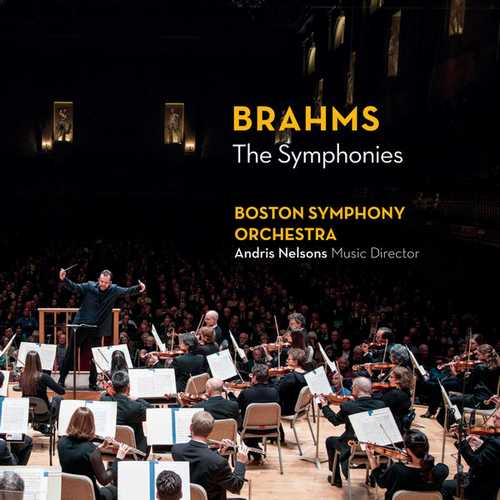

Composer: Johannes Brahms
Orchestra: Boston Symphony Orchestra
Conductor: Andris Nelsons
Number of Discs: 3
Format: FLAC (tracks)
Label: BSO Classics
Catalogue: BSOCL1701
Release: 2017
Size: 4.01 GB
Recovery: +3%
Scan: cover
CD 01
Symphony No. 1 in C minor, Op. 68
01. I. Un poco sostenuto—Allegro
02. II. Andante sostenuto
03. III. Un poco allegretto e grazioso
04. IV. Adagio—Più Andante—Allegro non troppo ma con brio—Più Allegro
CD 02
Symphony No. 2 in D major, Op. 73
01. I. Allegro non troppo
02. II. Adagio non troppo
03. III. Allegretto grazioso (quasi andantino)
04. IV. Allegro con spirito
Symphony No. 3 in F major, Op. 90
05. I. Allegro con brio
06. II. Andante
07. III. Poco Allegretto
08. IV. Allegro—Un poco sostenuto
CD 03
Symphony No. 4 in E minor, Op. 98
01. I. Allegro non troppo
02. II. Andante moderato
03. III. Allegro giocoso
04. IV. Allegro energico e passionato
The Boston Symphony Orchestra and Andris Nelsons are pleased to announce the release of their latest recordings on BSO Classics-a three-disc set of the four Brahms symphonies, recorded live during concert performances at Symphony Hall this past November, engineered by the same in-house team that produced the BSO’s recent Grammy-winning Shostakovich recordings under Maestro Nelsons on Deutsche Grammophon. This new Brahms symphony cycle follows two others recorded previously by the BSO, under Erich Leinsdorf in the mid-1960s and Bernard Haitink in the early 1990s. “It makes me so proud and happy,” observes Andris Nelsons, “that the Boston Symphony Orchestra of today, filled with so many great musicians, will now have its own place in recorded history with this amazing music.”
The title Brahms might seem an odd one for this collection of Brahms piano pieces, containing one piano sonata and an assortment of 12 short pieces, mostly from the end of the composer’s life. Yet the program does cover a good deal of Brahms’ keyboard thinking: piano compositions, except for variation sets, are sparse during his middle years. The Piano Sonata No. 3 in F minor, Op. 5, dates from 1853, when Brahms was 20: it is youthful music par excellence, with five movements and a shifting set of moods that pose interpretive challenges for the pianist. Freire has been playing the sonata since his teenage years, and he manages to make the music sound deliberate and inevitable despite its rather feverish intensity. With the exception of the final Waltz in A flat major, Op. 39, No. 15, Freire plays the rest of the music chronologically. The listener has the sense of being drawn into a vortex of complexity as each work seems to explore new structural possibilities. You could sample almost anywhere, but try the uniquely flexible tonal implications of the first of the four Klavierstücke, Op. 119, a work that shows clearly why the “conservative” Brahms was so beloved by the 12-tone composers to come. The only possible way you might not like Freire’s deeply thought-out, precise performances of these is if you like your Brahms on the warmer side, but the dispassionate, investigative way Freire has it is probably the fastest way into these works that really take a lifetime to appreciate. A major Brahms release, with sympathetic engineering from Decca at the Friedrich-Ebert-Halle in Hamburg.